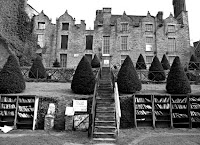
Sunday, March 18, 2007
Cinematic Inspiration: The Phantom of the Opera

New Release from Antonia Pearce!

Regency Dress of the Month: March

Morning Dress, Ackermann's
Morning dress were generally plain and allowed for ease of movement. Generally, they were worn with a cap, as seen in the image above, and the arms and chest were covered. Morning dresses were appropriate both for remaining at home or for early (before noon) walks or carriage rides in the park. The lady above is no doubt working on her morning correspondence, perhaps responding to an invitation or communicating with friends back at home if it is during the London season.
From Regency Etiquette: The Mirror of Graces (1811)
"There are a race of women, who, priding themselves on their superior rank, or wealth, or talents, affect to despise what they deem the adventitious aids of dress. When this folly is seen in female authors, or, what is much the same thing, ladies professing a particularly literary taste, we can at once traces its motive. Wishing to be thought superior to founding any regard on external ornament, they forget external decency; and by slatternness and affectation, render, what is called a learned woman, a kind of scare-crow of her own sex, and a laughing-stock to the other. This error is not so common now with bookish ladies, as it was in the beginning of the last century. Then our sex did, indeed, show that 'a little learning is a dangerous thing.'"
Revising and Editing
2. Editing- My absolute best advice, and I guarantee it will work: Read your manuscript aloud. As a composition teacher, I've seen many grammatical errors over the years, which could be easily remedied if the author would go line by line through the manuscript, reading aloud and checking the sentence structure. Yes, you have written a novel, and yes, it's long, but it's yours. Do you really want it showing up at an editor's desk looking anything less than polished and perfect? If you need some brushing up on grammatical concepts, the OWL website is comprehensive and filled with exercises, examples, and techniques relating to grammar and mechanics.
Saturday, March 17, 2007
Wild Rose Press: New Release
 Now available from The Wild Rose Press.
Now available from The Wild Rose Press.Congratulations to my fellow Romance Diva, Jennifer, on her new release!
Desert of Desire by Dara Edmundson
New York reporter Eve Mason is perfectly content in her comfortable world shunning romance for fear of the inevitable heartbreak. When she's sent to interview reclusive author Red Calloway in Sedona, Arizona, she discovers the passion she's been missing her whole life in his desert paradise.
Second Chance Rose by Terry Odell
Rose has had her one true love. After her husband's death, she moves across the country and discovers the special garden her mother told her about in childhood bedtime stories. When she meets Richard, friendship blooms. But can there be second chances for true love?
Garden of Sin by Jennifer Leeland
Shy but brilliant and unsure around women, Forrest Sterling asks Mira Serrano for help. Despite her misgivings, she agrees and a favor turns into something neither can forget. Eight years later, Forrest is back to claim the woman he never forgot. Now, he's giving the lessons to convince Mira that they belong together and he'll use any method to do it.
Monday, March 12, 2007
Reading at Risk Report
Sunday, March 11, 2007
Inspiration
 You never know when inspiration will strike. I was hard at work researching various locales of England for my novel when I came across an interesting article by Beatrice Sant called "Wandering Down the Wye" (Realm Magazine, October 2006). Within the article, she briefly mentioned that Hay-on-Wye's castle was turned into a bookshop. Being an unrepentant bibliophile, I found that fact fascinating and instantly went into further research mode. Apparently, the entire town is devoted to books, literally millions of them, and has over 40 bookstores. My imagination went into overdrive, and I thought how I would love to work in a castle-bookshop. Hence, "The Earl's Enchantment" was born.
You never know when inspiration will strike. I was hard at work researching various locales of England for my novel when I came across an interesting article by Beatrice Sant called "Wandering Down the Wye" (Realm Magazine, October 2006). Within the article, she briefly mentioned that Hay-on-Wye's castle was turned into a bookshop. Being an unrepentant bibliophile, I found that fact fascinating and instantly went into further research mode. Apparently, the entire town is devoted to books, literally millions of them, and has over 40 bookstores. My imagination went into overdrive, and I thought how I would love to work in a castle-bookshop. Hence, "The Earl's Enchantment" was born.
To the left, you can see a photo of the exterior of the castle, which Richard Booth revitalized when he purchased it. I think creating an original and vivid setting is essential, and with inspiration like Hay Castle, it makes my job as a writer that much easier.
Writing Tips: Drafting
 Okay, so you have the idea, you've brainstormed it for awhile, and now it's time to get down to business. Still, the idea of composing a full draft is daunting, especially when you're working on a novel. What's worse is there's no special secret except staying rooted to your computer for a set time each day. What has helped me is to set up a calendar (actually, two calendars). The first calendar is in an inexpensive daybook, where I jot down the number of words written each day. Then, as a small reward, I give myself a sticker. It's elementary but still a nice treat. Buy the prettiest stickers you can find, and by the end of the month, you'll have a colorful display of the amount of work you've done.
Okay, so you have the idea, you've brainstormed it for awhile, and now it's time to get down to business. Still, the idea of composing a full draft is daunting, especially when you're working on a novel. What's worse is there's no special secret except staying rooted to your computer for a set time each day. What has helped me is to set up a calendar (actually, two calendars). The first calendar is in an inexpensive daybook, where I jot down the number of words written each day. Then, as a small reward, I give myself a sticker. It's elementary but still a nice treat. Buy the prettiest stickers you can find, and by the end of the month, you'll have a colorful display of the amount of work you've done.The second calendar is on my computer, where I have a chart set up in Word where I document the number of words written each day. In the last two rows of the chart, I log in how many words written that week and then log the number written thus far this year. I actually received this idea from the website Rose's Colored Glasses, which has an excellent (free) newsletter for writers.
Saturday, March 10, 2007
Writing Tips: Brainstorming

Friday, March 9, 2007
Writing Tips: Back to Basics
1. Brainstorm
2. Draft
3. Revise
4. Edit
Wednesday, March 7, 2007
Cover for "The Earl's Enchantment"
 Much excitement over here- I just received the cover for "The Earl's Enchantment," which is coming soon from The Wild Rose Press.
Much excitement over here- I just received the cover for "The Earl's Enchantment," which is coming soon from The Wild Rose Press. BookCrossing
Monday, March 5, 2007
Essential Reading for the Romance Writer
Deb Stover has posted online a wonderful excerpt from her book How to Write a Romance for the New Markets. It's called "The Purple Prose Eater" and manages to be both funny, relevant, and informative about the use of language in romance novels. If you're suffering from a rejection notice, her "rejection protocol for writers" is humorous and comforting.
Maggie Toussaint's web site also has some words of advice and encouragement for the new writer. I especially enjoyed her article "Banishing Your Wolf of Self-Doubt" and wish I had seen that article months ago. After completing my first romance story, I hesitated to submit it because of doubts over whether it was any good. As I've learned, it's better to submit and then move on with your next work than to stew over one story.
Sunday, March 4, 2007
Authors' Websites
Once I had completed my first romantic short story and was halfway through my novel, I began considering the issue of the website. Should I have a website? Should I hire a designer? Who would be the potential audience for the site? I think it's important to consider these types of questions before making the investment of time and money because as I've found, a lot more goes into building and maintaining a website than I had anticipated. At first, I did contemplate hiring a web design finally decided to hold off until I have a book under contract. So, in the end, it took about a week of training with much trial and error to get my site up and running.
I recently revised my website, and I've found the best way to make my website as professional and attractive as possible is to gather ideas by visiting as many author websites as possible (read: hundreds). Since I already knew who else was writing in my genre, it was easy to visit the RWA and the Beau Monde websites to find links. One tip that I've found especially useful is to join webrings that share similar interests. Once I started browsing through websites, I discovered several webrings in my genre and promptly applied for membership.
More later on the Internet presence and the author . . .
Happy writing!










